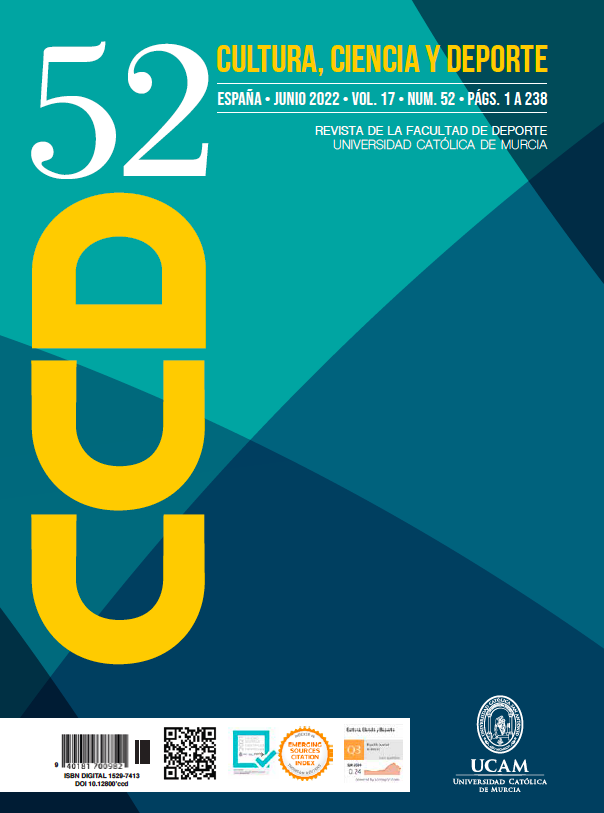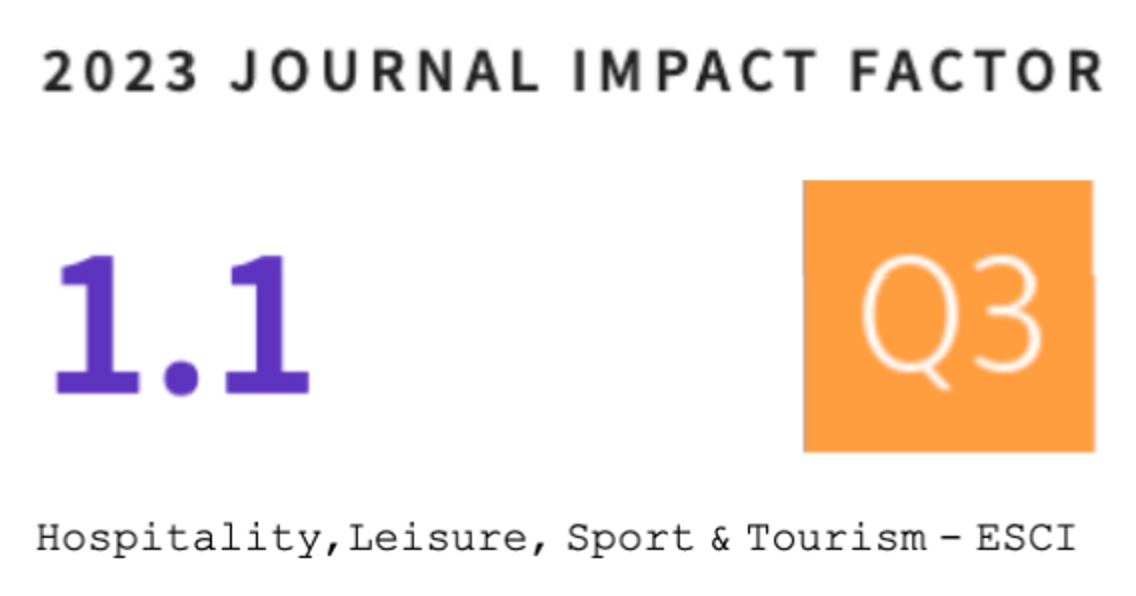Do gender and the subject influence young students’ psychological needs and positive and negative outcomes?
DOI:
https://doi.org/10.12800/ccd.v17i52.1712Palabras clave:
adolescentes, disfrute, satisfacción, frustración, utilidad percibidaResumen
The present study aimed to analyze and compare gender differences in the basic psychological needs (BPN) in several subjects (Physical Education, Mathematics, English and Language, and Literature) in terms of satisfaction/frustration, the perceived subject importance, and perceived usefulness of the subject matters, and the degree of enjoyment/boredom perceived by secondary students. In addition, the differences between the subjects in the mean scores of all these motivational variables were analyzed. Participants were 1754 Spanish students (986 girls and 768 boys) in 3rd (n = 991) and 4th grade (n = 763) of secondary education with an average age of 15.70 years (± 0.75). An independent-sample t-test to assess possible gender differences and a paired t-test were carried out to compare the variables in the different subjects. The results revealed significant differences in the majority of variables analyzed according to gender, with higher values for girls than boys in need satisfaction, the perceived usefulness the enjoyment of most subjects, and lower values in need frustration and boredom. In addition, significant differences were found when comparing the four subjects. Specifically, Physical Education (PE) had significantly higher values in need satisfaction and enjoyment and significantly lower scores in need frustration, perceived usefulness, and boredom than the other subjects analyzed. These gender and betweensubjects differences should be considered when teachers design and develop methodological strategies to carry out their roles with young students.
Citas
Alevriadou, A., & Pavlidou, K. (2016). Teachers’ interpersonal style and its relationship to emotions, causal attributions, and type of challenging behaviors displayed by students with intellectual disabilities. Journal of Intellectual Disabilities, 20(3), 213-227. https://doi.org/10.1177%2F1744629515599108
American Psychological Association. (2010). Publication manual of the American Psychological Association (6ª Ed). Autor.
Appel, M., Kronberger, N., & Aronson J. (2011). Stereotype threat impairs ability building: Effects on test preparation among women in science and technology. European Journal of Social Psychology, 41, 904-913. https://doi.org/10.1002/ejsp.835
Baena-Extremera, A., Granero-Gallegos, A., Pérez-Quero, F. J., & Bracho-Amador, C. (2012). Versión española del Sport Satisfaction Instrument (SSI) adaptado a la Educación Física. Psicodidáctica, 17(2), 377-395.
Barkoukis, V., Koidou, E., Tsorbatzoudis, H., & Grouios, G. (2012). School and classroom goal structures: Effects on affective responses in physical education. Physical Educator, 69(3), 211.
Behzadnia, B., Adachi, P., Deci, E., & Mohammadzadeh, H. (2018). Associations between students' perceptions of physical education teachers' interpersonal styles and students' wellness, knowledge, performance, and intentions to persist at physical activity: A self-determination theory approach. Psychology of Sport and Exercise, 39, 10-19.
https://doi.org/10.1016/j.psychsport.2018.07.003
Bourne, J., Liu, Y., Shields, C. A., Jackson, B., Zumbo, B. D., & Beauchamp, M. R. (2015). The relationship between transformational teaching and adolescent physical activity: The mediating roles of personal and relational efficacy beliefs. Journal of Health Psychology, 20(2), 132-143. https://doi.org/10.1177%2F1359105313500096
Bryan, C. L., & Solmon, M. A. (2012). Student motivation in physical education and engagement in physical activity. Journal of Sport Behavior, 35(3).
Butler, R. (2014). Motivation in Educational Contexts: Does Gender Matter? Advances in Child Development and Behavior (J. B. Benson, Ed.), 47 (pp.1-35). https://doi.org/10.1016/bs.acdb.2014.05.001
Cairney, J., Kwan, M. Y., Velduizen, S., Hay, J., Bray, S. R., & Faught, B. E. (2012). Gender, perceived competence and the enjoyment of physical education in children: a longitudinal examination. International Journal of Behavioral Nutrition and Physical Activity, 9(1), 1-8. https://doi.org/10.1186/1479-5868-9-26
Cheon, S. H., & Reeve, J. (2015). A classroom-based intervention to help teachers decrease students’ amotivation. Contemporary Educational Psychology, 40, 99-111. https://doi.org/10.1016/j.cedpsych.2014.06.004
Cheon, S. H., Reeve, J., Lee, Y., & Lee, J. W. (2018). Why autonomy-supportive interventions work: Explaining the professional development of teachers’ motivating style. Teaching and Teacher Education, 69, 43-51. https://doi.org/10.1016/j.tate.2017.09.022
Cuevas, R., Sánchez-Oliva, D., Bartholomew, K. J., Ntoumanis, N., & García-Calvo, T. (2015). Adaptation and validation of the psychological need thwarting scale in Spanish physical education teachers. The Spanish Journal of Psychology, 18, E53. https://doi.org/10.1017/sjp.2015.56
Deci, E. L., & Ryan, R. M. (2000). The ‘‘what’’ and ‘‘why’’ of goal pursuits: Human needs and the self-determination of behavior. Psychological Inquiry, 11, 227-268. https://doi.org/10.1207/S15327965PLI1104_01
Deci, E. L., & Ryan, R. M. (2008). Self-determination theory: a macrotheory of human motivation, development, and health. Canadian Psychology, 49(3), 182-185. https://doi.org/10.1037/a0012801
Del Castillo, O. (2012). La equidad de género en Educación Física: influencia de los medios de comunicación. Aula Abierta, 40(1), 63-72.
Dettweiler, U., Lauterbach, G., Becker, C., & Simon, P. (2017). A Bayesian Mixed Methods Analysis of Basic Psychological Needs Satisfaction through Outdoor Learning and Its Influence on Motivational Behavior in Science Class. Frontiers in Psychology, 8, 2235. https://doi.org/10.3389/fpsyg.2017.02235
Escribano, L. G., Casas, A. G., Fernández-Marcote, A. E., López, P. J. T., & Marcos, M. L. T. (2017). Revisión y análisis de los motivos de abandono de práctica de actividad física y autopercepción de competencia motriz. Journal of Negative and No Positive Results, 2(2), 56-61. https://doi.org/10.19230/jonnpr.1225
Escriva-Boulley, G., Tessier, D., Ntoumanis, N., & Sarrazin, P. (2018). Need-supportive professional development in elementary school physical education: Effects of a cluster-randomized control trial on teachers’ motivating style and student physical activity. Sport, Exercise, and Performance Psychology, 7(2), 218-234. https://doi.org/10.1037/spy0000119
Fernández-Lasarte, O., Goñi, E., Camino, I., & Zubeldia, M. (2019). Ajuste escolar y autoconcepto académico en la Educación Secundaria. Revista de Investigación Educativa, 37(1), 163-179. https://doi.org/10.6018/rie.37.1.308651
Ganley, C. M., & Vasilyeva, M. (2011). Sex differences in the relation between math performance, spatial skills, and attitudes. Journal of Applied Developmental Psychology, 32, 235–242. https://doi.org/10.1016/j.appdev.2011.04.001
Gil-Madrona, P., Cuevas-Campos, R., Contreras-Jordán, O. R., & Díaz-Suarez, A. (2012). Educación Física y hábitos de vida activa: percepciones de los adolescentes y relación con el abandono deportivo. Aula Abierta, 40(3), 67-82.
Gnambs, T., & Hanfstingl, B. (2016). The decline of academic motivation during adolescence: An accelerated longitudinal cohort analysis on the effect of psychological need satisfaction. Educational Psychology, 36(9), 1691-1705. https://doi.org/10.1080/01443410.2015.1113236
Gottfried, A. E., Fleming, J. S., & Gottfried, A. W. (2001). Continuity of academic intrinsic motivation from childhood through late adolescence: A longitudinal study. Journal of Educational Psychology, 93(1), 3-13. https://doi.org/10.1037/0022-0663.93.1.3
Haerens, L., Aelterman, N., Van den Berghe, L., De Meyer, J., Soenens, B., & Vansteenkiste, M. (2013). Observing physical education teachers’ need-supportive interactions in classroom settings. Journal of Sport and Exercise Psychology, 35(1), 3-17. https://doi.org/10.1123/jsep.35.1.3
Haerens, L., Aelterman, N., Vansteenkiste, M., Soenens, B., & Van Petegem, S. (2015). Do perceived autonomy-supportive and controlling teaching relate to physical education students’ motivational experiences through unique pathways? Distinguishing between the bright and dark side of motivation. Psychology of Sport and Exercise, 16, 26–36. https://doi.org/10.1016/j.psychsport.2014.08.013
Jaakkola, T., Yli-Piipari, S., Barkoukis, V., & Liukkonen, J. (2017). Relationships among perceived motivational climate, motivational regulations, enjoyment, and PA participation among Finnish physical education students. International Journal of Sport and Exercise Psychology, 15(3), 273-290. https://doi.org/10.1080/1612197X.2015.1100209
Jang, H., Kim, E. J., & Reeve, J. (2016). Why students become more engaged or more disengaged during the semester: A self-determination theory dual-process model. Learning and Instruction, 43, 27-38. https://doi.org/10.1016/j.learninstruc.2016.01.002
Jang, H., Reeve, J., & Deci, E. L. (2010). Engaging students in learning activities: It is not autonomy support or structure but autonomy support and structure. Journal of Educational Psychology, 102, 588-600. https://doi.org/10.1037/a0019682
Martínez, F. D. M., & González-Hernández, J. (2018). Práctica de actividad física, conducta prosocial y autoconcepto en adolescentes: conexiones en el contexto escolar. Electronic Journal of Research in Education Psychology, 16(46), 555-577. http://dx.doi.org/10.25115/ejrep.v16i46.2235
Moreno, J. A., González-Cutre, D., Chillón, M., & Parra, N. (2008). Adaptación a la educación física de la escala de las necesidades psicológicas básicas en el ejercicio. Revista Mexicana de Psicología, 25(2), 295-303.
Moreno, J. A., González-Cutre, D., & Ruiz, L. M. (2009). Self-Determinated Motivation and Physical Education Importance. Human Movement, 10(1), 5-11.
Moreno, J. A., Hellín, P., & Hellín, M. G. (2006). Pensamiento del alumno sobre la educación física según la edad. Apunts: Educación Física y Deportes, 85, 28-35.
Muñoz-González, V., Gómez-López, M. & Granero-Gallegos, A. (2019). Relación entre la satisfacción con las clases de Educación Física, su importancia y utilidad y la intención de práctica del alumnado de Educación Secundaria Obligatoria. Revista Complutense de Educación, 30(2), 479-491. https://doi.org/10.5209/RCED.57678
Ng, B. L., Liu, W. C., & Wang, J. C. (2016). Student motivation and learning in mathematics and science: A cluster analysis. International Journal of Science and Mathematics Education, 14(7), 1359–1376. https://doi.org/10.1007/s10763-015-9654-1
Padilla Carmona, M. T., García Gómez, M. S., & Suárez Ortega, M. (2010). Diferencias de género en el autoconcepto general y académico de estudiantes de 4º de ESO. Revista de Educación, 352, 495-515.
Pelegrín, A., León, J. M., Ortega, E., & Garcés de Los Fayos, E. J. (2012). Programa para el desarrollo de actitudes de igualdad de género en clases de educación física en escolares. Educación XX1, 15(2), 271-292. http://doi.org/10.5944/educxx1.15.2.142
Reeve, J., & Cheon, H. S. (2014). An intervention-based program of research on teachers' motivating styles. In S. Karabenick y T. Urdan's (Eds.), Advances in Motivation and Achievement, 18(297-343). Bingley, UK: Emerald Group Publishing. https://doi.org/10.1108/S0749-742320140000018008
Rodríguez, L. R., & Gómez, E. M. (2018). Propuesta de igualdad de género en Educación Física: adaptaciones de las normas en fútbol. Retos: nuevas tendencias en educación física, deporte y recreación, 33, 293-297.
Rodríguez, J. R., Sanmiguel-Rodríguez, A., & Álvarez-Seoane, D. (2018). Revisión bibliográfica en el contexto español sobre investigaciones relacionadas con los libros de texto y materiales didácticos en educación física. Retos: nuevas tendencias en educación física, deporte y recreación, 34, 363-370.
Ryan, R. M., & Deci, E. L. (2017). Self-determination theory: Basic psychological needs in motivation, development, and wellness. Guilford Publications.
Sánchez-Oliva, D., Pulido-González, J. J., Leo, F. M., González-Ponce, I., & García-Calvo, T. (2017). Effects of an intervention with teachers in the physical education context: A Self-Determination Theory approach. PloS One, 12(12), e0189986. https://doi.org/10.1371/journal.pone.0189986
Seder, A. C., & Villalonga, H. B. (2016). Importance of study habits on adolescents' academic achievement: gender differences. Educación Siglo Xxi, 34(1), 157-172. https://doi.org/10.6018/j/253261
Shen, B., Li, W., Sun, H., & Rukavina, P. B. (2010). The Influence of Inadequate Teacher-to-Student Social Support on Amotivation of Physical Education Students. Journal of Teaching in Physical Education, 29(4), 417–432. https://doi.org/10.1123/jtpe.29.4.417
Studenska, A. (2011). Educational level, gender and foreign language learning self-regulation difficulty. Procedia-Social and Behavioral Sciences, 29, 1349-1358. https://doi.org/10.1016/j.sbspro.2011.11.373
Su, Y. L., & Reeve, J. (2010). A meta-analysis of the effectiveness of intervention programs designed to support autonomy. Educational Psychology Review, 23, 159-188. https://doi.org/10.1007/s10648-010-9142-7
Tsai, Y. M., Kunter, M., Lüdtke, O., Trautwein, U., & Ryan, R. M. (2008). What makes lessons interesting? The role of situational and individual factors in three school subjects. Journal of Educational Psychology, 100(2), 460-472. https://doi.org/10.1037/0022-0663.100.2.460
Tze, V. M., Daniels, L. M., & Klassen, R. M. (2016). Evaluating the relationship between boredom and academic outcomes: A meta-analysis. Educational Psychology Review, 28(1), 119-144. https://doi.org/10.1007/s10648-015-9301-y
Vansteenkiste, M., & Ryan, R. M. (2013). On psychological growth and vulnerability: basic psychological need satisfaction and need frustration as a unifying principle. Journal of Psychotherapy Integration, 23(3), 263. https://doi.org/10.1037/a0032359
Vasconcellos, D., Parker, P. D., Hilland, T., Cinelli, R., Owen, K. B., Kapsal, N., Lee, J., Antczak, D., Ntoumanis, N., Ryan, R. M., & Lonsdale, C. (2020). Self-determination theory applied to physical education: A systematic review and meta-analysis. Journal of Educational Psychology, 112(7), 1444. https://doi.org/10.1037/edu0000420
Zaravigka, K., & Pantazis, V. (2012). Equality of the genders in physical education: The students' perceptions. Journal of Physical Education and Sport, 12(3), 350-357. http://doi.org/10.7752/jpes.2012.03052
Publicado
Cómo citar
Número
Sección
Licencia
Derechos de autor 2022 Creative Commons Attribution License

Esta obra está bajo una licencia internacional Creative Commons Atribución-NoComercial-CompartirIgual 4.0.
Los autores que publican en esta revista están de acuerdo con los siguientes términos:- Los autores conservan los derechos de autor y garantizan a la revista el derecho de ser la primera publicación del trabajo al igual que licenciado bajo una Creative Commons Attribution License que permite a otros compartir el trabajo con un reconocimiento de la autoría del trabajo y la publicación inicial en esta revista.














